‘A country of missing people’: How Russia is vanishing thousands of Ukrainians
The Missing: In her latest investigation, international correspondent Bel Trew reports from Sumy, Kharkiv, Dnipro and Poltava, speaking to Ukrainians and families of victims who were captured and taken to Russia in another possible war crime

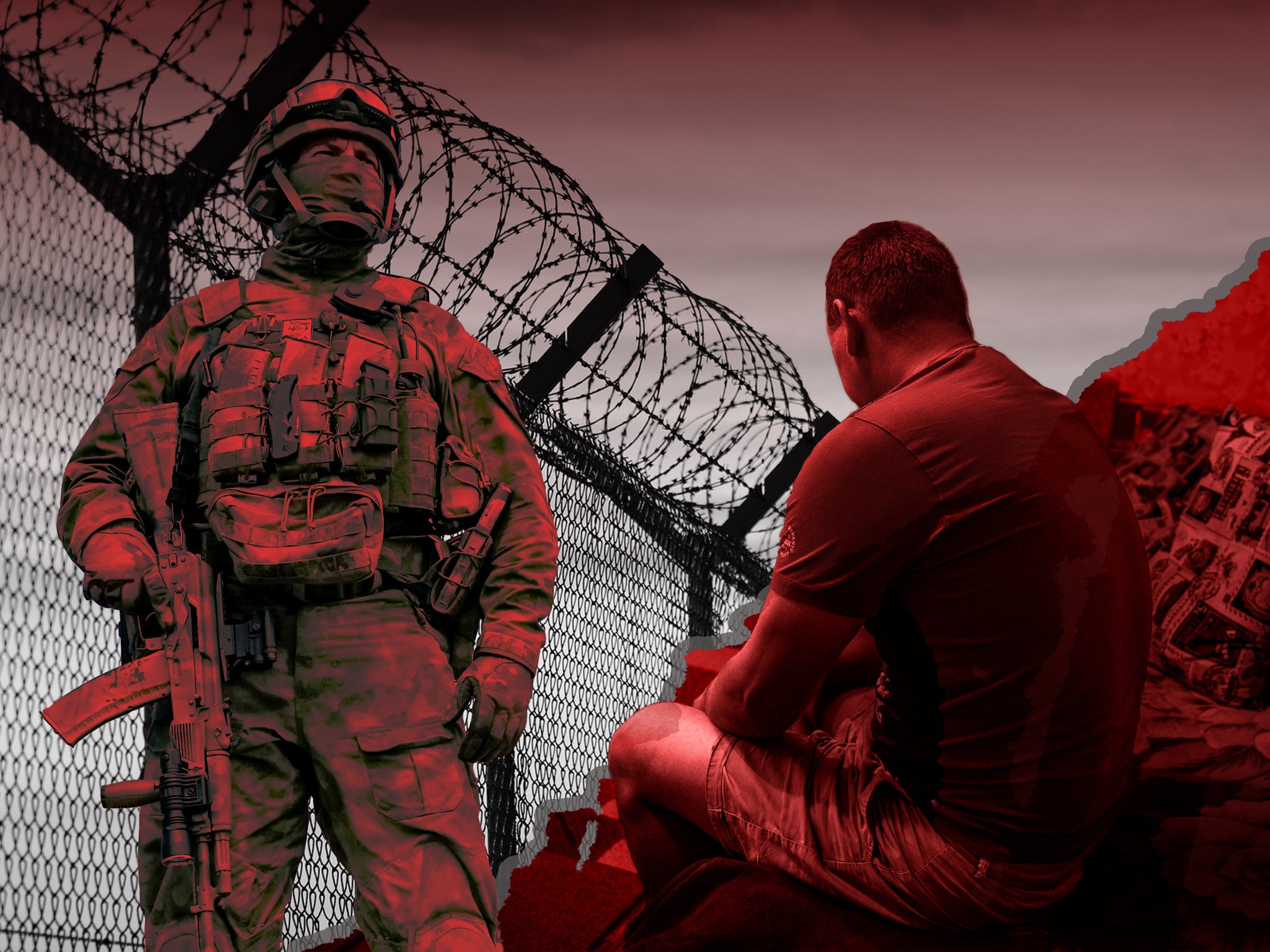
Your support helps us to tell the story
From reproductive rights to climate change to Big Tech, The Independent is on the ground when the story is developing. Whether it's investigating the financials of Elon Musk's pro-Trump PAC or producing our latest documentary, 'The A Word', which shines a light on the American women fighting for reproductive rights, we know how important it is to parse out the facts from the messaging.
At such a critical moment in US history, we need reporters on the ground. Your donation allows us to keep sending journalists to speak to both sides of the story.
The Independent is trusted by Americans across the entire political spectrum. And unlike many other quality news outlets, we choose not to lock Americans out of our reporting and analysis with paywalls. We believe quality journalism should be available to everyone, paid for by those who can afford it.
Your support makes all the difference.It is early March. Just a few weeks into Vladimir Putin’s invasion of Ukraine, and in three different corners of the country, a group of civilians are being “vanished”.
In Trostyanets, a town then under Russian occupation, close to Ukraine’s northeast border, Andriy, 35, a furniture maker, and his father-in-law are making a rare trip out to search for dwindling supplies. A Russian military vehicle quietly pulls up beside them, and the soldiers order them to get in.
Some 140km east, in Kharkiv city, Igor, 33, is finishing a day volunteering with evacuees in the city’s railway station when he realises he has forgotten the keys to his flat. He decides to take shelter during curfew hours in the family summer house just outside the city, but is stopped at a checkpoint on the way.
Meanwhile, 500km south, in Nova Kakhovka, an occupied town on the coast, Serhiy, 60, a journalist, activist and former soldier, is trying to cross a Russian-controlled bridge to deliver supplies to elderly friends. He is pulled to the side when the men at the checkpoint recognise him.
In three corners of the country – in unrelated incidents on a random day, 12 March – these civilians are quietly disappeared by Russian soldiers.
All of them will eventually end up in prisons in Russia, which rights groups say is evidence of enforced disappearance and forcible transfer – potential war crimes. Their families will spend weeks and months desperately, and vainly, searching for them. Only one of them – Andriy – will return.
“The soldiers said ‘Get into the car.’ They put bags over our heads, they handcuffed us, they wanted to ‘check’ us,” the father of two says, describing the moment when his nightmare began to unfold. “They told us they would take us to Russia, where someone more senior would decide what to do with us.
“When they loaded us into a truck from Trostyanets and started to drive out of the town, it was terrifying. I sat down next to my father-in-law and said, that’s it, we will never return home again.”
Andriy and his father-in-law were subjected to mock executions, beaten and interrogated, and moved between various detention centres, including a tented camp in Shebekino, a Russian town close to the border. There he was held with dozens of soldiers captured from Snake Island.
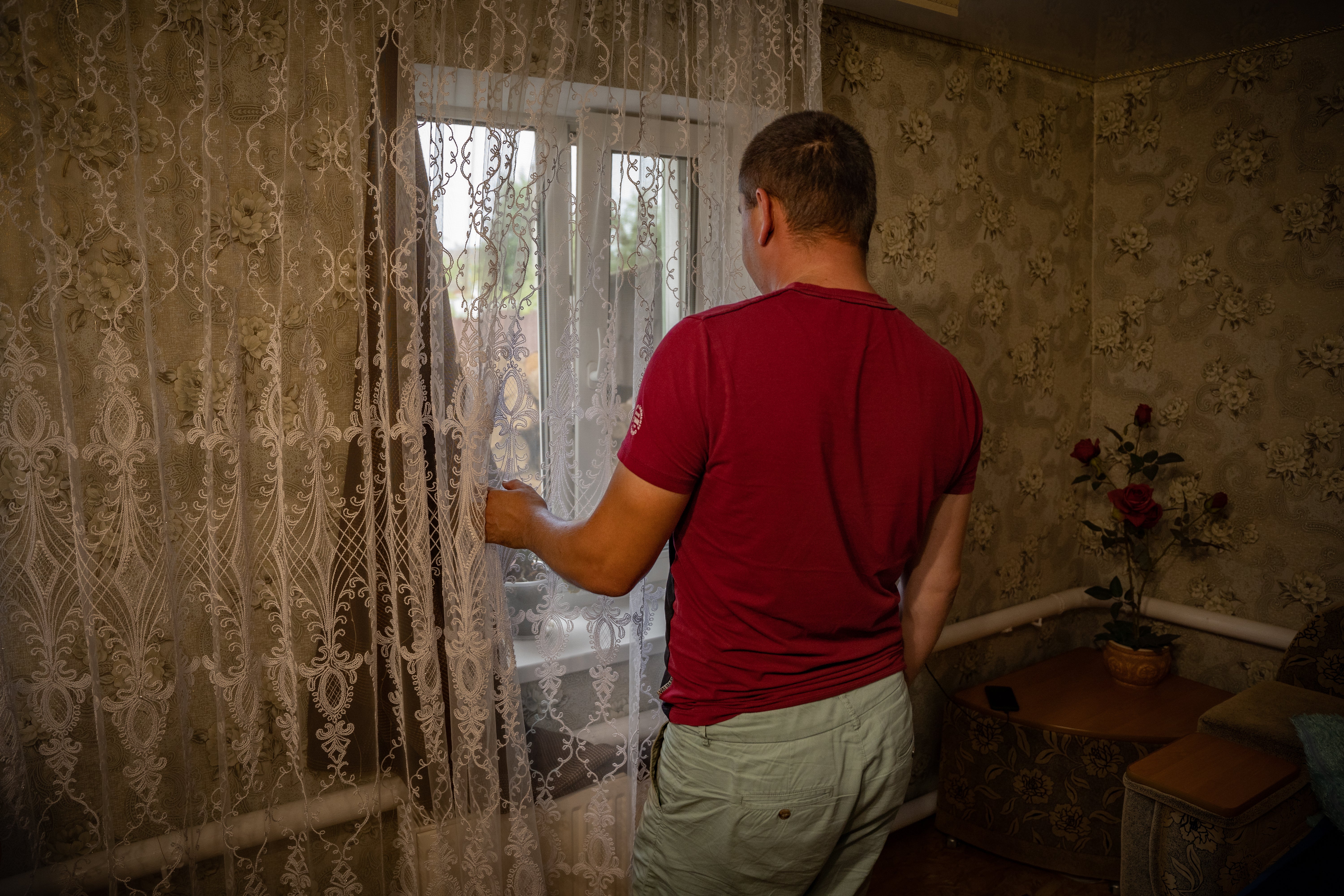
He was eventually interned in a prison in Stary Oskol, around 180km east of the Ukrainian border, where he found himself in a cell with civilians who had been taken not only from his region, Sumy, but also from Kharkiv and Kyiv. He said the prison appeared to have been emptied of Russian inmates and filled instead with at least 500 Ukrainians.
“During the journey they almost killed us. One soldier accused us of being members of the military, and attacked my father-in-law with a shovel. They shot twice next to our heads.”
He was held in Stary Oskol until mid-April, when he was inexplicably chosen to be included in a prisoner swap. To this day, he doesn’t know why. After an odyssey around Russia, in which 66 civilian detainees and PoWs were gathered from different prisons, he was dumped back in Ukraine. But his father-in-law and his six cellmates – who included Igor – remain behind bars.
The last eyewitness account of Serhiy, meanwhile, places him in a Russian-run prison in Crimea, a region that Moscow illegally annexed in 2014. But his wife says there are new reports he was moved to Voronezh, a southwestern district of Russia, just next to Stary Oskol.
And this is what makes the ordeal all the more terrifying for civilians, says Andriy, now back in his hometown of Trostyanets. “I was never charged with anything. I was never allowed to inform my family about where I was. As far as I’m aware, I’m the only person of those detained with me to get out alive,” he says shakily.
“I still have nightmares,” he continues quietly. “The smallest sound makes me jump. Most days I wake up in a sweat.”
Both Ukrainian and Russian officials estimate that nearly 2 million Ukrainians have been moved to Russia since the start of the war. Russia claims this is part of an evacuation effort to save lives. Ukrainian officials speaking to The Independent, along with countries including the United States, have accused Moscow of forcibly deporting civilians.
Russia has repeatedly denied committing any crimes in Ukraine, since President Putin launched his invasion in February. The Russian embassy in London did not respond to requests for comment about these particular allegations, or the testimonies gathered.
But as part of a months-long investigation into the tens of thousands of Ukrainians who have gone missing since the war began, The Independent has found fresh evidence of probable violations of international law and of possible war crimes, including the widespread illegal transfer of civilians and the forcible disappearance of them into prisons in Russia, as well as hostage-taking.
According to evidence from victims, family members of the missing, local officials and international rights groups, it appears that there are three main organised routes by which civilians are transferred to prisons in Russia. They are taken from the northwest parts of the country via Belarus, or from the northeast to transitional military camps along the border, or via annexed Crimea in the south.
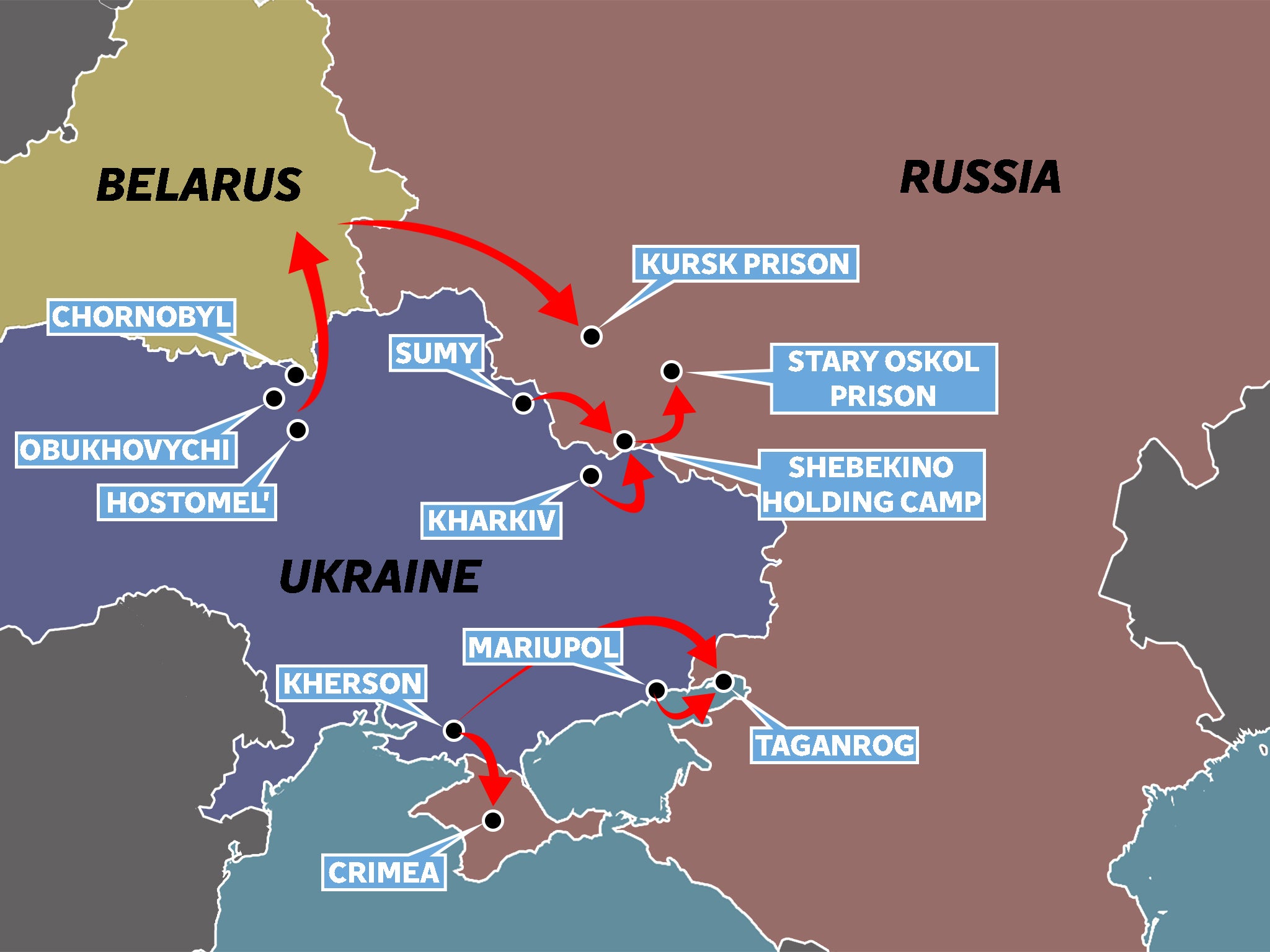
As part of its reporting, The Independent has followed the stories of six different Ukrainians who have been forcibly transferred to Russia and disappeared in prisons there. During the process, we were able to locate two men and inform their families of their whereabouts.
We also spoke to civilians who were not interned in Russian prisons but were moved against their will – and sometimes even without their knowledge – from Ukraine to far-flung locations in Russia as part of the controversial process of “filtration” by Russian soldiers and their proxies as they evacuated recently occupied towns. This could also be a grave breach of the fourth Geneva Convention on the protection of civilians, and may constitute a war crime.
The Independent also spoke to residents in occupied towns, who said they were told by Russian soldiers that civilians were being deliberately rounded up as leverage in future prisoner exchanges, which may also constitute the war crime of hostage-taking. Andriy said that he and other civilians with him were effectively counted as soldiers during a prisoner-of-war swap in April, when he was finally released (though The Independent was unable to verify this).
Allan Hogarth of Amnesty International, who was sent The Independent’s testimonies, said that the Russian authorities must “urgently” investigate these reports, and that their failure to do should “increase the resolve of the international community to step in and deploy international mechanisms to investigate and deliver justice”.
“Civilians under the power of enemy forces should be protected from any abuse at all times. Their forcible transfer or deportation from occupied territory, and their torture or other ill treatment, amount to crimes under international law,” said Hogarth.
Belkis Wille, of Human Rights Watch (HRW), said that the “disturbing allegations” are consistent with a range of abuses that HRW has documented, including executions, torture, enforced disappearances, arbitrary detention, and rape.
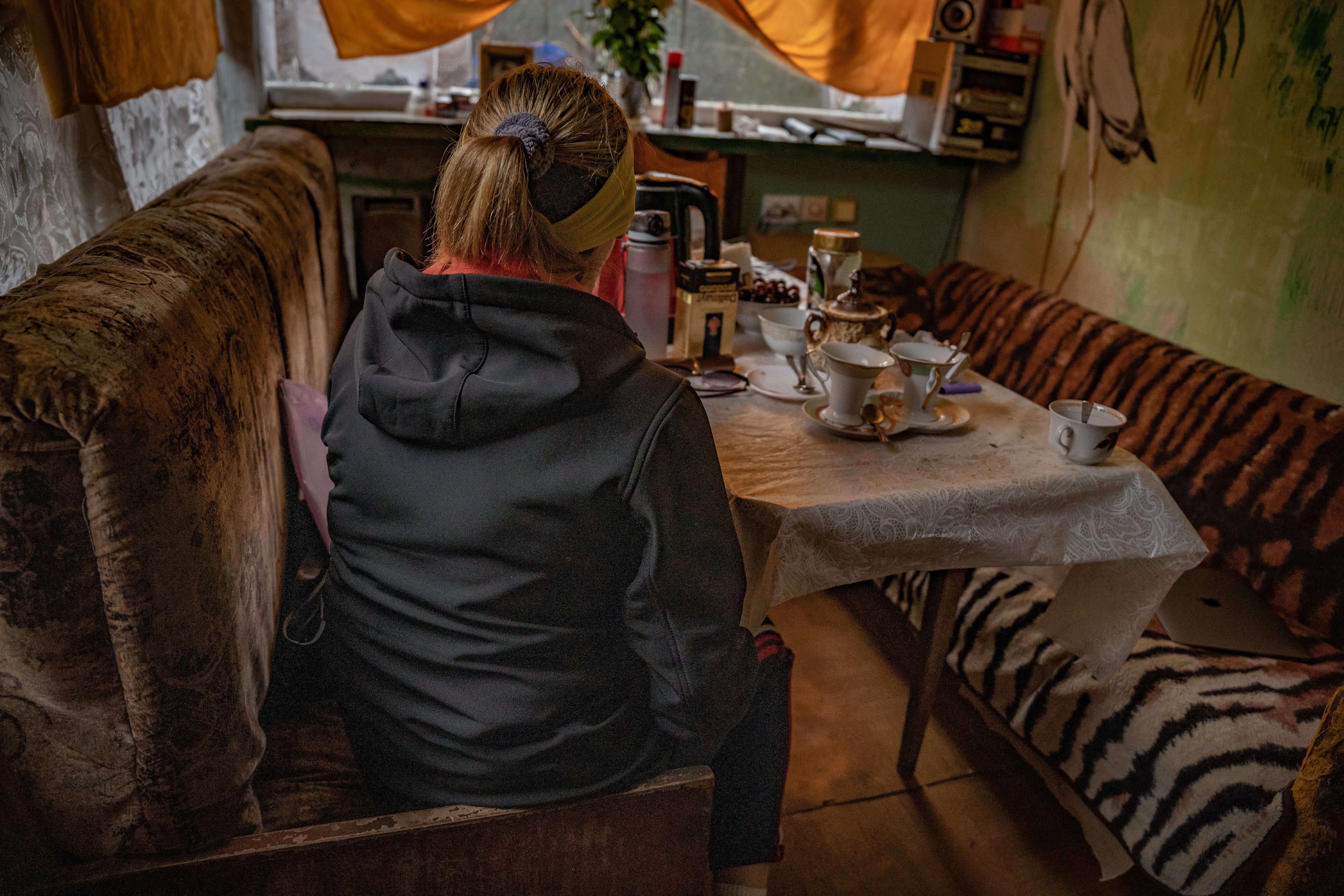
THE NORTHEAST ROUTE
The Chechen soldier sitting in Maria’s house had just attempted to rape her, and had only begrudgingly given up after learning she had a disability he mistook for a disease.
And so, warming himself by her fire, to pass the time he started playing with his gun. And as he did this, he told her how Russian forces were deliberately taking Ukrainian civilians to use as leverage in prisoner swaps involving Russian soldiers.
Maria was frozen in terror. She was alone with her 12-year-old son after soldiers had taken her husband a few hours before. All she could do was sit and watch this man methodically take the ammunition out of his weapon and put it back in.
“He told me, ‘We need more of you Ukrainians so we can get more of our soldiers back,’” says Maria, trembling and in tears. “He accused my husband of being a Nazi, all of us of being Nazis.”
That day was 17 March, five days after the others had been taken, in a tiny village just outside Trostyanets.
Earlier that afternoon, soldiers had raided the house, apparently concerned by reports that Maria’s husband Roman, 39, a construction worker and part-time hunter, had a hunting rifle. They broke the weapon and took him. Later she would find out that Roman was one of three men abducted from her village on that day alone. In total, 10 men from the area, all disappeared during the Russian occupation, are still missing.
“I was scared that he would be forced to fight, I was afraid that he could be killed. I asked at all the checkpoints. And then after the Russians left I went to the Ukrainian police, the security forces, I applied to every organisation I could to find him,” she says in desperation.
She even applied to the military administration of the Sumy region, where her village is located, and the capital Kyiv for help. “But we found out nothing. It wasn’t until Andriy was released in April and called me out of the blue that I had any news of my husband.”
We had been waiting so long for information, it never occurred to me he wouldn’t be in Ukraine. And now what? How do we get him home?
Just before Andriy was ordered out of Stary Oskol, his cellmates scribbled down the numbers of their relatives on a scrap of paper that he secretly smuggled out. This has now become routine for Ukrainians vanished into Russian or Russian-proxy jails.
As soon as he got back to Trostyanets – like so many others – he called all the numbers he could to inform the families that their loved ones were alive. Among those numbers was Maria’s.
He was able to fill in the blanks: Roman had been taken to a nearby village called Boromlya, and was tortured for 10 days before eventually being taken to Russia, ending up in Stary Oskol.
In a previous visit to Trostyanets, just after Russian soldiers had withdrawn, The Independent was shown photos of bodies found tortured and killed in Boromlya, where Russian soldiers had set up an informal headquarters. We were told of the disappearances of multiple men from the Trostyanets region, among them Andriy.
One man, a retired colonel, who was briefly held in an underground torture chamber we uncovered under Trostyanets railway station, was also apparently taken to Stary Oskol. This had become a well-trodden route from northeast Ukraine to the camps and prisons of Russia.
“When I heard my husband was alive, I was screaming and crying at the same time. I didn’t know what to do,” Maria continues, crumbling into tears. “We had been waiting so long for information, it never occurred to me he wouldn’t be in Ukraine. And now what? What can we do? How do we get him home?”
But at least she knew where he was.
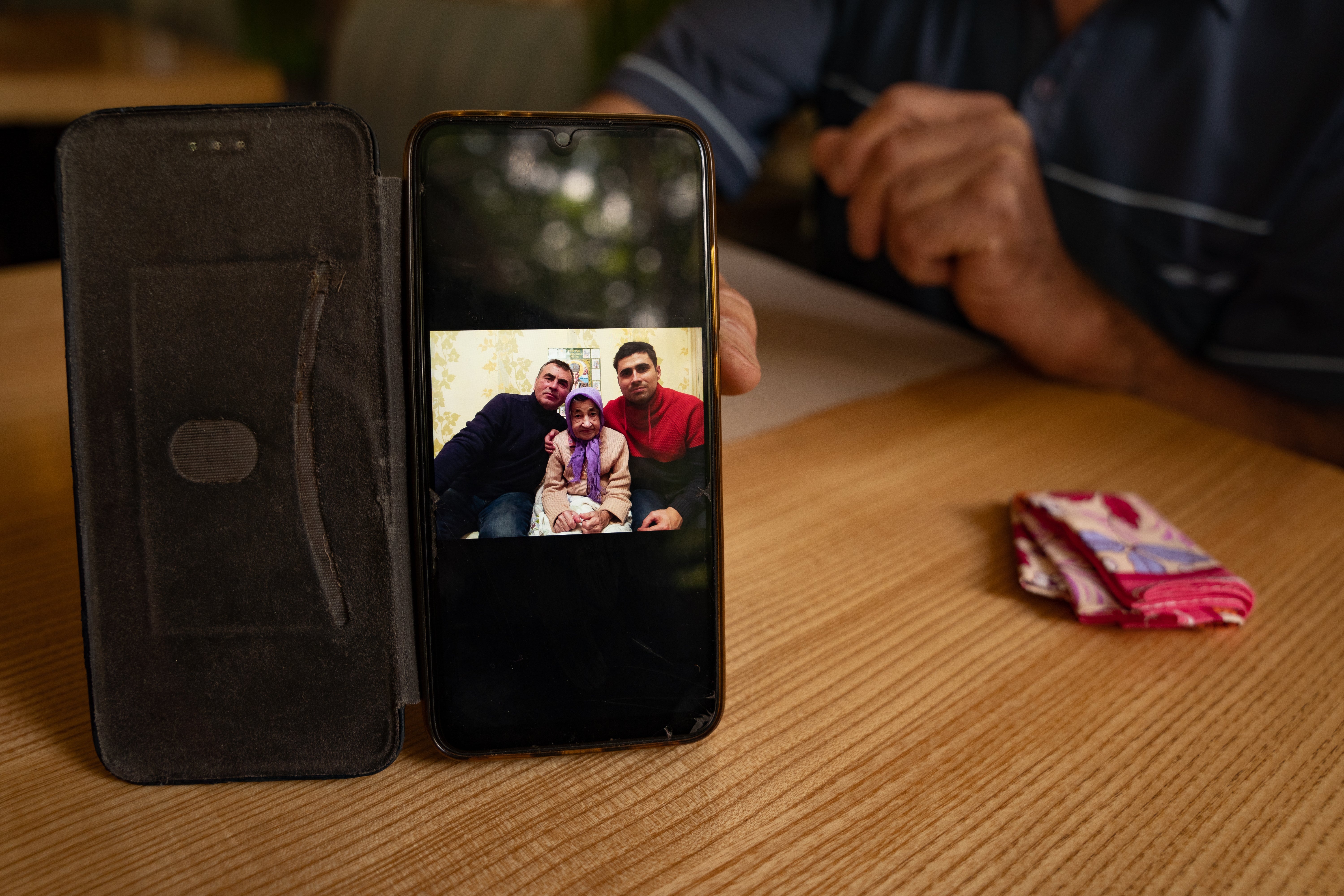
Igor was the person appointed to scribble down the phone numbers of the cellmates’ relatives on the tiny scrap of paper that Andriy smuggled out of jail. But in the rush, it seems he forgot to write down his own. It was only when Andriy got home and started making phone calls that he realised Igor’s number was missing. And by then it was too late.
But as part of the investigation, trawling through the online posts of missing people, we located Igor’s family in Kharkiv. After checking Igor’s photo and details with Andriy, we were able to speak to his parents, sadly confirming their fears that he was in prison in Russia, specifically in Stary Oskol.
Igor’s parents said that the electrician had vanished on 12 March after finishing his volunteer work at the main railway station of Kharkiv, which was being heavily shelled. They last heard from him when he called to say he had mislaid his keys to the family flat in North Saltivka, one of the hardest hit areas of Kharkiv.
“We told him to just sleep in one of the local shelters. It was coming up to curfew, but it seems for whatever reason he ignored this,” his mother tells us from the city, which is still under heavy fire.
Andriy filled in the gaps – Igor had decided to drive a few miles north to stay in the family summer house in Tsyrkuny.
He didn’t realise that this area was a moving front line and was partially occupied by Russian forces, and was taken at a checkpoint. He was eventually deposited in a cell with Andriy in Stary Oskol, where they sat day and night, singing songs and reciting poetry to keep their spirits up.
“It is a relief to hear he is alive and being treated OK, but the information from Andriy is now a few months ago and we just hope he is still fine,” his mother continues, her voice aching with grief.
She says that, even with this knowledge, the family “don’t know where to look for help anymore”. “Instead I pray to god every day, and ask him to bring back my son. That is all I can do.”
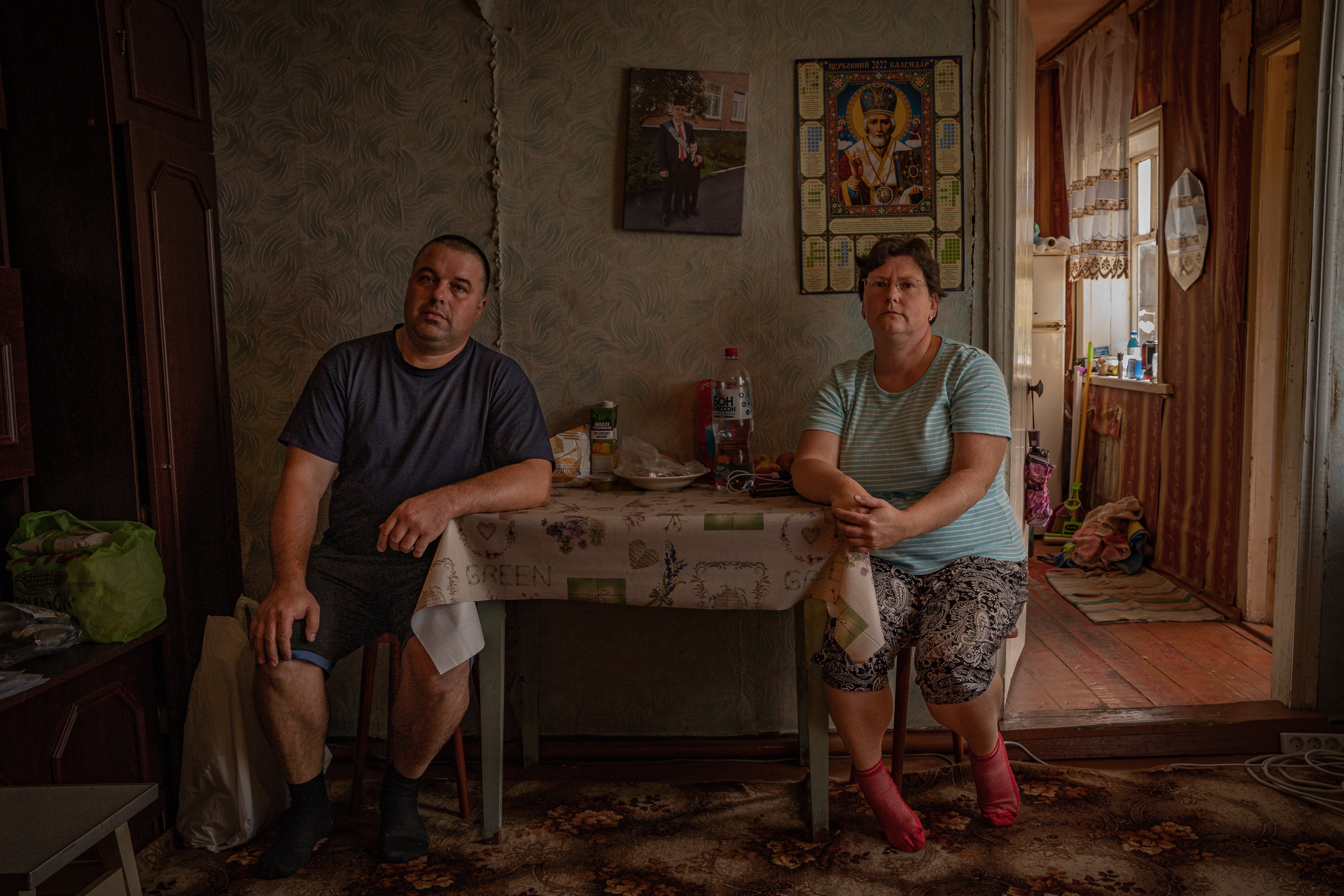
THE NORTHWEST ROUTE
The Russians nicknamed it the Russian highway, and Ukrainian residents of the area quickly learned that crossing it amounted to having a death wish.
This was the northern corner of the Kyiv region, where in the early weeks of the war a 64 km convoy of Russian soldiers, tanks, armoured cars and weapons was spotted on satellite imagery, shakily advancing on the capital.
Along that route lived Natasha and her husband Konstantin, a Russian citizen and longtime Ukrainian resident. On 5 March, Konstantin, fearful his relatives were cut off from supplies in the nearby village of Obukhovychi, decided to risk the “Russian highway” to get food to them. He never came back.
It was only a month later, after a successful Ukrainian counteroffensive and the subsequent Russian withdrawal, that Natasha was finally able to get to Obukhovychi to piece together what had happened to her vanished husband. All she found was Konstantin’s empty car, riddled with bullets.
Like so many families, she applied to the police and the International Committee of the Red Cross (ICRC) for information, and received nothing back. The third Geneva Convention grants the ICRC the right to go wherever PoWs might be found and to conduct interviews with them. But the ICRC has said that its officials have not been granted full access to all facilities.
And so Natasha took to Facebook to beg for information. “Then in May, a guy who had just been released from Kursk prison in Russia saw my Facebook post and messaged to say he had been in prison with Konstantin there,” she says. Kursk is 120 miles north of Kharkiv.
As Konstantin’s family was Russian, they were in a unique position to be able to go to the prison, employ lawyers, and demand confirmation that he was indeed there. And later they went on to fight the charges against him: allegedly working against Russian proxy soldiers in occupied territory more than 1000km from where he lived in northern Ukraine.
At the end of June, he was released and was able to fill in the rest of the story.
“A Russian soldier stabbed him in the leg while interrogating him, a wound which never properly healed. They stole the shoes off his feet, which were freezing in minus temperatures,” says Natasha.
Only those who had poor-quality cheap shoes that no one wanted were permitted to keep them. But the soldiers doused them in water, which froze, adding to the suffering, she continues.
It turns out that Konstantin had been ambushed in his car. He was first taken to Hostomel airport, which Russian soldiers had captured, and then to Chernobyl, home to the nuclear plant that blew up in 1986. They bound his hands and legs so tightly, and dragged him so roughly, he had muscle lacerations.
On 8 March, together with 120 other prisoners, he was taken to Belarus by helicopter and then by plane to Kursk. There, he said, they were held with 12 people in one cell, and were permitted no exercise or sunlight. They were all Ukrainians from the Kyiv region, and their route had been the same: to Kursk via Belarus.
When he was released, he too, like Andriy, memorised a list of numbers of the families of the people in his cell, and updated their relatives on the fate of their loved ones. “It really feels it is up to chance, to coincidences, that someone happens to see your post. It is up to us, the families, to find people,” Natasha adds desperately.
And this is how Marina, 39, found out about the fate of her son Oleksander, 20, who was doing his military service and was by chance stationed at Hostomel airport when the Russians invaded.
She lost contact with him on the first day of the war as he was locked in one of the fiercest battles of the conflict. Living just outside of nearby Ivankiv, the family spent all of March in a basement at the orphanage where Marina works, without electricity, phone signal or water.
“It was only until April, when we got internet connection back and we were able to find a Facebook group for those whose children were missing from Hostomel, that we found out what happened,” she explains.
A soldier who had been released on 28 March had posted a list of the people he had been jailed with. All of them had transited through Belarus to Kursk, like Konstantin. But Marina doesn’t know if Oleksander is still there.
A civilian from a nearby village, who was also held in Kursk prison and released later, said he saw Oleksander the day before he was freed, but was told that Oleksander was about to be transferred. “That was mid-April; we don’t know where he is being held, where he was transferred to. The worst thing is he doesn’t even know if we’re alive.”
And so it is this “human factor” that families of the missing have to rely on, says Gayde Rizayeva, herself a former detainee, who was tasked by the authorities to coordinate the efforts of the government, NGOs and civilians to try to locate the thousands of civilians and soldiers who have vanished.
It is sometimes just random luck, she continues. “Someone could be looking for his son, and accidentally finds a different person, which makes it easier for us to find someone else,” she explains. “If anyone is released, we ask him, do you have people in your cell? We show them pictures of the missing people.
“But it relies on people reporting their missing loved ones, or on the trickle of people who get let out.”
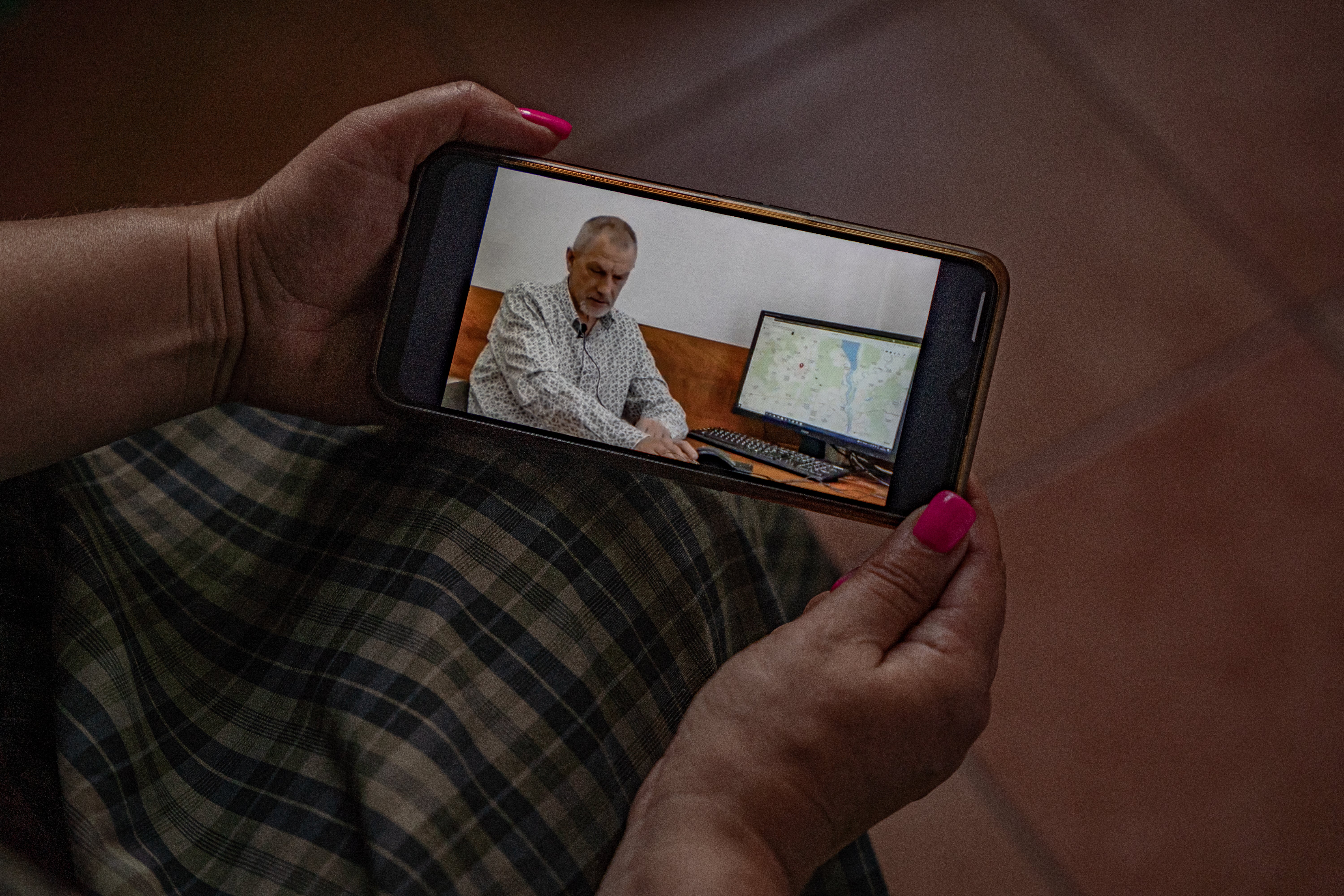
THE SOUTHERN ROUTE
More than a month after Serhiy, a journalist and activist, vanished, he suddenly reappeared – on a news segment of a Russian TV channel. It caught his wife, Olena, like a hand around her throat. She hadn’t heard from him since he had gone to deliver supplies to vulnerable elderly people on 12 March.
And there he was, in a button-down collared shirt he would never wear, with a slight tremor in his hands, sitting in an undisclosed location, denouncing the Ukrainian army.
The former Ukrainian soldier, activist and journalist had supported rallies against Russia’s occupation of the southern region of Kherson, where he lives. He was very public in his views about Putin’s invasion, and now this channel was saying that he was cooperating with the Russian authorities.
His wife, who knows his tics well, can see he is strained. She believes he is wearing a collared long-sleeve shirt to cover bruises.
“In the video, it says his location is Russia, but we don’t know where. He looks like he has head injuries and broken fingers, and it seems like his lungs are damaged, as at points it’s difficult for him to speak,” his wife continues numbly.
“I am sure that he was under duress. He is accusing Ukrainians of targeting civilians. He loved Ukraine with all his heart.”
He vanished on the morning of 12 March – the same day as Andriy and Igor. At 4pm that same day, Oleh Baturin, the editor-in-chief of a well-known pro-Ukrainian media outlet and a colleague of Serhiy, said he received a phone call from Serhiy asking to meet.
But it was a trap, Baturin later said to Olena and in interviews with Ukrainian media.
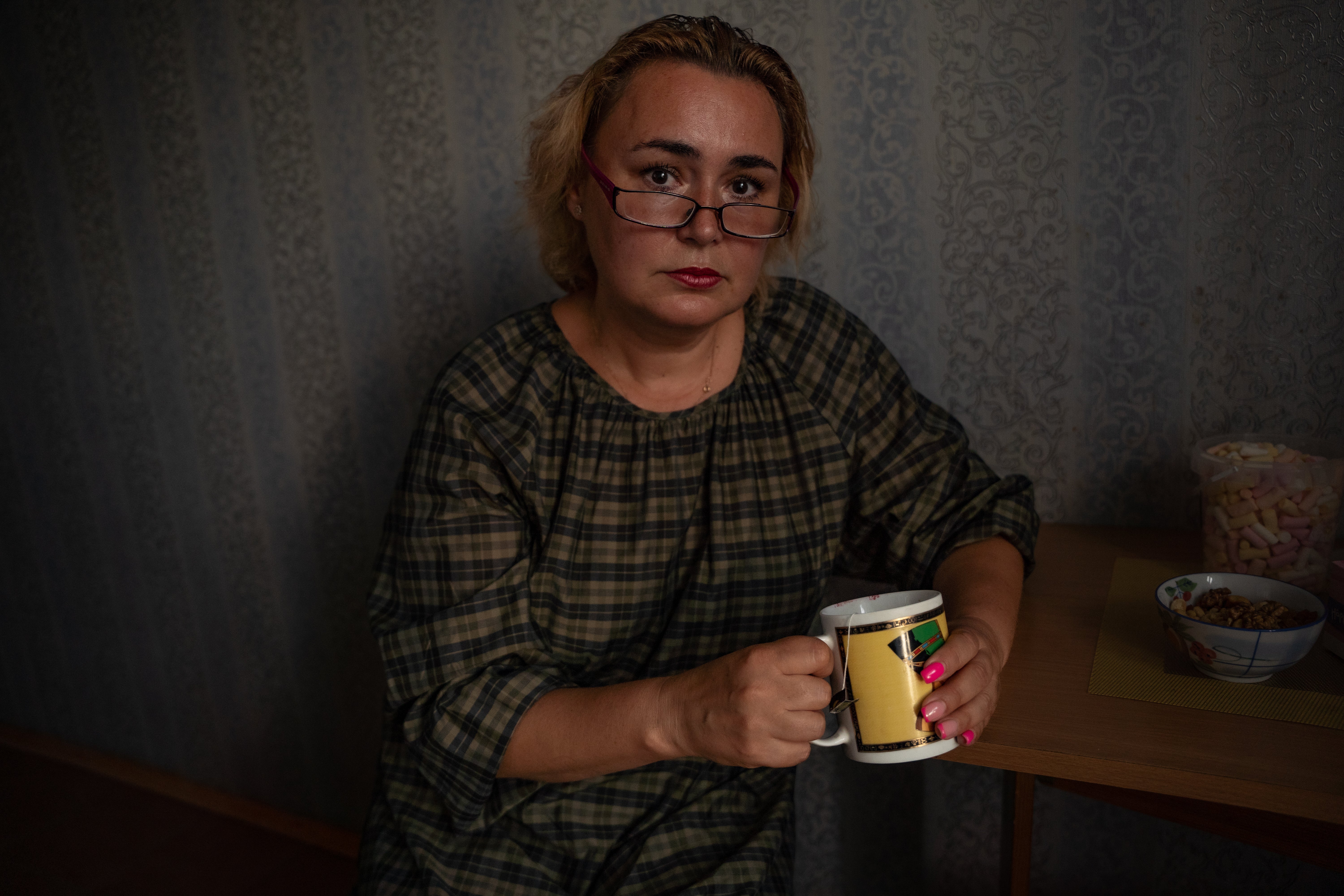
Serhiy was already in detention and was forced to make the phone call. Baturin said that both he and Serhiy were tortured.
“Until now we have no confirmed information about where he is, how he is doing, how he is being treated,” Olena continues. “We think he is in prison in Simferopol in Crimea, or now in Voronezh, but we don’t know.” She fears the worst.
Anti-occupation activists released from prisons in the south of Ukraine speak of horrific treatment. Maksym, 29, an ecologist who was arrested in March after an anti-occupation protest in the city of Kherson, said he was held for 10 days in an underground basement that was so cramped everyone had to crouch. They were only allowed out for interrogations. He shows us the X-rays of his broken ribs and legs.
Many of his friends who vanished at the same time are still missing, including a Spanish citizen.
“It is worse than hell, because one second lasts like an eternity. It’s not just fearing what is happening to you now, but what could happen next,” he adds shakily. “In the occupied south of Ukraine, every family has at least one close person who is in captivity or was in captivity. It’s like a small country of missing people.”
I was only able to survive through this hell because I had one goal: to see my daughter again
FILTRATION
Nadiya, 71, didn’t realise she was in Russia until she was forced onto a train by a soldier and told she would be taken to the centre of the country.
She had survived the worst of the bombing of Mariupol, in the south of the country, hiding in the basement of a nearby stadium. During the capture of the city, soldiers from the Russian-backed self-proclaimed Donetsk People’s Republic arrived and ordered everyone in the makeshift shelter to walk to a nearby village.
Elderly, caring for a partially disabled adult son, all Nadiya could do was comply. She was shuttled between numerous villages along the coast, ending up in the eastern village of Dokuchaevsk for “filtration”. This process has been flagged by the United Nations as leading to disappearances and arbitrary detention. The UN has warned that those subjected to it are at high risk of torture or ill treatment.
Although Nadiya “passed”, and repeatedly told the soldiers she wanted to stay in Ukraine, she was put on another bus. She only realised she had left the country when she found herself at Taganrog railway station, 60 km into Russia.
“There, a soldier told me: ‘Go, Babushka, get to the train, or you’ll stay here at the station with the homeless,’” she continues, speaking on the phone from France where she is now based. “I asked the steward on a train where we were heading to, and he said Samara [a region more than 1000km northeast of Mariupol] in central Russia.”
At that point, everyone on the train began to panic; even those who had consented to be transferred to Russia did not want to be taken that far. Nadiya says she later found out that civilians had been taken as far as the eastern flanks of Siberia, and towns close to the north pole. The Independent heard that some were being forced to fight in the Russian army.
“I told them again and again I wanted to stay,” says Nadiya.
She eventually arrived on 15 April in Syzran town in Samara, where she says she was put in a “hotel” that was guarded day and night by armed police. It wasn’t until Russian residents and civil society members helped her buy a ticket to Moscow that she was able to start the long journey to be reunited with her family.
“I made friends with a man I met in Moscow’s main bus station, who was leaving for one of the Baltic states, and he explained to me the way,” she continues. “I was only able to survive through this hell because I had one goal: to see my daughter again, who I loved so much.”

THE ODYSSEY
The journey home was an odyssey through Russia’s prisons. That morning, the guard at Stary Oskol ordered Andriy to pack his bags, and Andriy hurriedly scribbled down the numbers of his cellmates’ families. He memorised messages of greeting. They prayed. They hugged.
He was first taken by aeroplane to Kursk, then to Voronezh, then to Taganrog, and at each point they picked up other Ukrainian civilian detainees, including female police officers from Mariupol.
The final destination was a three-storey facility in Sevastopol in annexed Crimea, where Andriy described 200 Ukrainians sleeping in bunk beds and desperately waiting and hoping to be placed on a Red Cross prisoner swap list.
At dawn one day, he was woken up. A group of 16 civilians and 60 soldiers, many badly wounded, were gathered on buses and taken to no man’s land in the Zaporizhzhia region. It was only when peering through the dawn gloom that Andriy saw a Ukrainian soldier waving a white flag on the other side, and believed he could finally be safe.
One by one their names were called out, and they made the trembling journey across a broken bridge. Thirty Russian soldiers did the same walk back: a ratio of two to one.
“In all my 35 years on this planet, I would never have believed this would have happened to me,” he says in disbelief. “I would never have believed how many Ukrainians, both civilians and military, would be held in captivity. How indiscriminately we were all taken.”
Andriy – like the families of all the other vanished Ukrainians – spends every day trying to find news of his father-in-law, who remains behind bars. Maria, waiting for news of her husband, who is also still in Stary Oskol, says her life stopped the moment he was taken, and every day is the same: the fruitless hunt for news.
“After March 17, my whole life just collapsed into emptiness. Until now, I still haven’t slept a single night,” she says, grief etched into her face. “I spend whole nights looking for information about my missing husband and prisoner exchanges on my phone.
“I have lost everything. Everything has been ripped out from underneath my feet; all my life is gone.”




Join our commenting forum
Join thought-provoking conversations, follow other Independent readers and see their replies
Comments